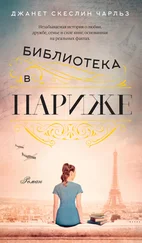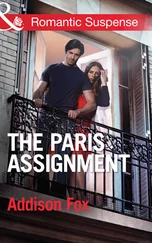Usually on Fridays, my parents hosted dinner club (Mom roasted spare ribs, Kay brought a salad, and Sue Bob baked an upside-down pineapple cake), so I spent the night at Mary Louise’s. Tonight, though, I stayed in my room and came up with questions for Mrs. Gustafson. As the adults ate, laughter spilled out of the dining room. When it got quiet, I knew that like lords and ladies in England, the women took themselves off so the men could settle into their chairs and say the things they couldn’t with their wives there.
While the women washed dishes, I listened to Mom’s other voice, the one she used with her friends. With them she seemed happier. Funny how the same person could be different people. This made me think that there were things about Mom I didn’t know, though she wasn’t mysterious like Mrs. Gustafson.
At my desk, I wrote down the questions as they came—When was the last time the guillotine sliced off someone’s head? Does France have Jehovah’s Witnesses, too? Why do folks say you stole your husband? Now that he’s dead, why do you stay?—concentrating so hard that I didn’t know Mom was behind me until I felt her hand warm my shoulder.
“You didn’t want to spend the night at Mary Louise’s?”
“I’m doing my homework.”
“On a Friday,” she said, unconvinced. “Rough day at school?”
Most days were rough. But I didn’t feel like talking about Tiffany Ivers. Mom pulled a present the size of a shoebox from behind her back. “I made you something.”
“Thanks!” I tore open the wrapping paper and found a crocheted sweater vest.
I pulled it on over my T-shirt, and Mom tugged at the waist, happy with the sizing. “You’re beautiful. The green brings out the flecks in your eyes.”
A glance in the mirror confirmed that I looked like a dork. If I wore the sweater to school, Tiffany Ivers would eat me alive.
“It’s… nice,” I told Mom, too late.
She smiled to hide her hurt. “So what are you working on?”
I explained that I had to do a report on France and that I needed to interview Mrs. Gustafson.
“Oh, hon, I’m not sure we should bother her.”
“I only have a few questions. Can’t we invite her over?”
“I suppose. What would you want to ask?”
I pointed to my paper.
Glancing at the list, Mom exhaled loudly. “You know, there might be a reason she’s never gone back.”
ON SATURDAY AFTERNOON, I hurried past Mrs. Gustafson’s old Chevy, up the rickety porch steps, and rang the doorbell. Ding-dang-dong. No answer. I rang the bell again. No one answered, so I tried the front door. It creaked open. “Hello?” I said, and walked in.
Silence.
“Anyone home?” I asked.
In the stillness of the living room, books covered the walls. Ferns lined a stand under the picture window. The stereo, the size of a deep freezer, could fit a body. I flipped through her record collection: Tchaikovsky, Bach, more Tchaikovsky.
Mrs. Gustafson shuffled down the hall as if she’d awoken from a nap. Even alone at home, she wore a dress with her red belt. In her stockinged feet, she seemed vulnerable. It occurred to me that I’d never seen a friend’s car in front of her house, never known her to host family. She was the definition of solitude.
Stopping a few feet from me, she glared like I was a robber come to steal her recording of Swan Lake . “What do you want?”
You know things, and I want to know them, too.
She crossed her arms. “Well?”
“I’m writing a report on you. I mean, on your country. Maybe you could come over so I can interview you.”
The edges of her mouth turned down. She didn’t respond.
The silence made me nervous. “It looks like a library in here.” I gestured to her shelves, which were full of names I didn’t know—Madame de Staël, Madame Bovary , Simone de Beauvoir.
Maybe this was a bad idea. I turned to go.
“When?” she asked.
I looked back. “How about now?”
“I was in the middle of something.” She spoke the words briskly, as if she were president and needed to get back to running the domain of her bedroom.
“I’m writing a report,” I reminded her, since school came right after God, country, and football.
Mrs. Gustafson slipped into her high heels and grabbed her keys. I followed her onto the porch, where she locked the door. She was the only person in Froid who did.
“Do you always barge into people’s homes?” she asked as we crossed the lawn.
I shrugged. “They usually answer the door.”
In our dining room, she clasped her hands, then let them go limp at her side. Her eyes flitted to the carpet, the window seat, the family photos on the wall. Her mouth moved to say something, possibly “Isn’t this nice?” like the other ladies would, then her jaw clamped shut.
“Welcome,” Mom said as she set a plate of chocolate chip cookies on the table.
I gestured for our neighbor to take a seat. Mom set mugs in front of her own plate and mine; in front of Mrs. Gustafson’s, she placed her teacup. I knew its story by heart. Years ago, when Mrs. Ivers had gone on a “castle tour” of England, Dad gave her money to buy a fancy tea set for Mom. But porcelain is pricey, and Mrs. Ivers returned with just one cup and saucer. Terrified the china would break, she kept it on her lap the entire transatlantic flight. In my mind, the slender cup covered in dainty blue flowers came from somewhere better. Finer. Like Mrs. Gustafson.
Mom served the tea; I broke the silence. “What’s the best thing about Paris? Is it really the most beautiful city in the world? What was it like growing up there?”
Mrs. Gustafson didn’t answer right away.
“I hope we’re not bothering you,” Mom told her.
“The last time I was interviewed like this was for a job back in France.”
“Were you nervous?” I asked.
“Yes, but I’d memorized entire books to prepare.”
“Did it help?”
She smiled ruefully. “There are always questions one is unprepared to answer.”
“Lily won’t be asking those kinds of questions.” Mom addressed Mrs. Gustafson, but her warning was meant for me.
“The best thing about Paris? It’s a city of readers,” our neighbor said.
She said that in friends’ homes, books were as important as the furniture. She spent her summers reading in the city’s lush parks, then like the potted palmettos in the Tuileries Garden, sent to the greenhouse at the first sign of frost, she spent winters at the library, curled up near the window with a book in her lap.
“You like to read?” For me, the classics assigned in English were a chore.
“I live to read,” she replied. “Mostly books on history and current events.”
That sounded about as fun as watching snow melt. “What about when you were my age?”
“I loved novels like The Secret Garden . My twin brother was the one interested in the news.”
A twin. I wanted to ask what his name was, but she’d moved on. Parisians revel in food almost as much as in literature, she said. It had been more than forty years, but she still remembered the pastry that her father brought her after her first day of work, a cake called a financier . Closing her eyes, she said the buttery almond powder made her mouth feel like heaven. Her mother adored opéras , swathes of deep, dark chocolate enveloped in layers of cake soaked in coffee… Fee-nahn-see-yay. Oh-pay-rah. I tasted the words and loved how they felt on my tongue.
“Paris is a place that talks to you,” she continued. “A city that hums along to its own song. In the summer Parisians keep their windows open, and one hears the tinkling of a neighbor’s piano, the snap of playing cards being shuffled, static as someone fiddles with the radio knob. There’s always a child laughing, someone arguing, a clarinetist playing in the square.”
Читать дальше
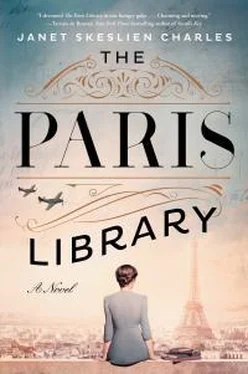
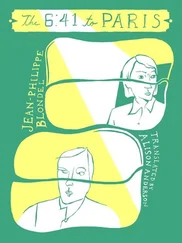
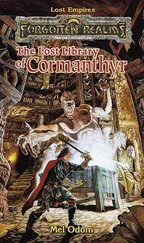
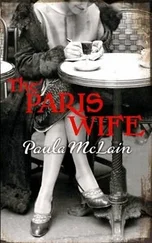


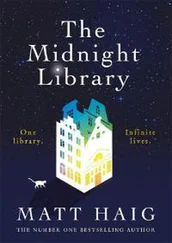
![Джанет Скеслин Чарльз - Библиотека в Париже [litres]](/books/391555/dzhanet-skeslin-charlz-biblioteka-v-parizhe-litres-thumb.webp)
